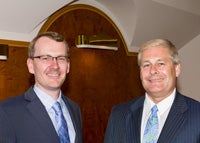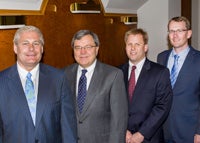Making Fixed Fees Work in a Small Law Department
By Jennifer J. Salopek
When Russ Dempsey joined United Retirement Plan Consultants, Inc., in 2008, it wasn't his first in-house job, and he knew what he didn't know.
"I am a corporate generalist who had joined a public company," he says. "I knew I would need help with the securities work."
In the environment of the economic downturn at the time, Dempsey saw an opportunity to take the lead on discussions on value-based fee arrangements. He proposed a shared-risk arrangement first to the leadership at Porter Wright Morris & Arthur LLP.
Russ Dempsey and Mark Koogler
"Porter Wright really welcomed the conversation with open arms, especially because we were willing to share the risk. It enabled us to build a partnership built on trust and collaboration," Dempsey says.
The initial agreement was for a monthly adjustable retainer for routine securities work; in addition, United Retirement pays a fixed amount on a monthly basis for "routine securities matters." The law firm and the in-house department collaboratively defined what work qualifies as "routine securities work."
The firm tracks hours and submits shadow bills to help determine the appropriateness of the retainer. If the billable hours worked on routine securities matters exceeds the fixed-fee amount, then the company is responsible for 50 percent of the excess. Similarly, if the billable value of monthly hours worked is less than the fixed-fee amount, then the company will be provided a discount of 50 percent of the amount minus the fixed fee.
For example: The company agrees to pay the firm $10,000 a month to handle these routine securities matters. Let's say that billable hours in September total $12,000. United Retirement is responsible for 50 percent of the amount in excess of the fixed amount of $10,000, or $1,000. The next month, the billable value of services provided for securities matters is $8,000. United Retirement receives a credit for 50 percent of the difference, or $1,000.
From left to Right: Mark Koogler,
Curtis Loveland, Jeremy D.
Siegfried & Russ Dempsey
Both parties agreed to review the fee arrangement at six-month intervals to confirm that it continues to be viewed as successful for the in-house law department and the firm. The program was successfully implemented for 18 months, resulting in reduced legal costs and improved budget predictability, and was discontinued only because United Retirement went private.
In a separate initiative, the United Retirement legal department and Porter Wright agreed to a fixed-fee arrangement for a number of lease negotiations. "When I was talking with Porter Wright about this series of leases, they were quick to point out the potential risks," says Dempsey. "I didn't want to create a list of risks that would kick us to an hourly billing arrangement, but rather a tool that would preserve the fixed-fee model."
Porter Wright and United Retirement developed a Risk Chart to address the specific risks as a mechanism for managing uncertainties relating to a fixed-fee engagement. After noting the fee, scope of the engagement, decision points and makers in the Risk Chart, the parties documented the risks, consequences, gave the risk a probability, mitigation strategy, triggers, and time for a project review.
Example of the Risk Chart relating to a fixed fee arrangement
| Risks |
|
| Consequence | More time spent by firm than budgeted |
| Probability | Time-consuming issues have a 70% probability. Completely erroneous lease is unlikely and only a 5% probability. |
| Mitigation |
|
| Trigger |
|
| Project Review | CLO and partner to review engagement after completion of lease project to determine effectiveness and examine whether there are any areas for improvement |
As a result of completing the Risk Chart, United Retirement and Porter Wright were able to negotiate a reasonably acceptable fixed-fee arrangement that addressed United Retirement's need for predictable legal expenses while allaying Porter Wright's concerns regarding the time required to negotiate onerous lease provisions.

